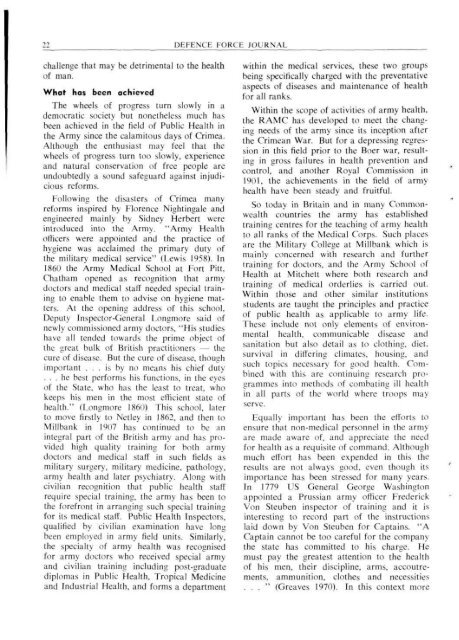ISSUE 3 : Mar/Apr - 1977 - Australian Defence Force Journal
ISSUE 3 : Mar/Apr - 1977 - Australian Defence Force Journal
ISSUE 3 : Mar/Apr - 1977 - Australian Defence Force Journal
You also want an ePaper? Increase the reach of your titles
YUMPU automatically turns print PDFs into web optimized ePapers that Google loves.
22 DEFENCE FORCE JOURNALchallenge that may be detrimental to the healthof man.What has been achievedThe wheels of progress turn slowly in ademocratic society but nonetheless much hasbeen achieved in the field of Public Health inthe Army since the calamitous days of Crimea.Although the enthusiast may feel that thewheels of progress turn too slowly, experienceand natural conservation of free people areundoubtedly a sound safeguard against injudiciousreforms.Following the disasters of Crimea manvreforms inspired by Florence Nightingale andengineered mainly by Sidney Herbert wereintroduced into the Army. "Army Healthofficers were appointed and the practice ofhygiene was acclaimed the primary duty ofthe military medical service" (Fewis 1958). In1860 the Army Medical School at Fort Pitt,Chatham opened as recognition that armydoctors and medical staff needed special trainingto enable them to advise on hygiene matters.At the opening address of this school.Deputy Inspector-General Fongmore said ofnewly commissioned army doctors, "His studieshave all tended towards the prime object ofthe great bulk of British practitioners - thecure of disease. But the cure of disease, thoughimportant ... is by no means his chief duty. . . he best performs his functions, in the eyesof the State, who has the least to treat, whokeeps his men in the most efficient state ofhealth." (Fongmore 1860) This school, laterto move firstly to Netley in 1862, and then toMillbank in 1907 has continued to be anintegral part of the British army and has providedhigh quality training for both armydoctors and medical staff in such fields asmilitary surgery, military medicine, pathology,army health and later psychiatry. Along withcivilian recognition that public health staffrequire special training, the army has been tothe forefront in arranging such special trainingfor its medical staff. Public Health Inspectors,qualified by civilian examination have longbeen employed in army field units. Similarly,the specialty of army health was recognisedfor army doctors who received special armyand civilian training including post-graduatediplomas in Public Health, Tropical Medicineand Industrial Health, and forms a departmentwithin the medical services, these two groupsbeing specifically charged with the preventativeaspects of diseases and maintenance of healthfor all ranks.Within the scope of activities of army health,the RAVIC has developed to meet the changingneeds of the arm> since its inception afterthe Crimean War. But for a depressing regressionin this field prior to the Boer war, resultingin gross failures in health prevention andcontrol, and another Royal Commission in1901, the achievements in the field of armyhealth have been steady and fruitful.So today in Britain and in many Commonwealthcountries the army has establishedtraining centres for the teaching of army healthto all ranks of the Medical Corps. Such placesare the Military College at Millbank which ismainly concerned with research and furthertraining for doctors, and the Army School ofHealth at Mitchett where both research andtraining of medical orderlies is carried out.Within those and other similar institutionsstudents are taught the principles and practiceof public health as applicable to army life.These include not only elements of environmentalhealth, communicable disease andsanitation hut also detail as to clothing, did.survival in differing climates, housing, andsuch topics necessary for good health. Combinedwith this are continuing research programmesinto methods of combating ill healthin all parts of the world where troops mayserve.Fqualh important has been the efforts toensure that non-medical personnel in the armyare made aware of, and appreciate the needfor health as a requisite of command. Althoughmuch effort has been expended in this theresults are not always good, even though itsimportance has been stressed for many years.In 1779 US General George Washingtonappointed a Prussian army officer FrederickVon Steuben inspector of training and it isinteresting to record part of the instructionslaid down by Von Steuben for Captains. "ACaptain cannot be too careful for the compansthe state has committed to his charge. Hemust pay the greatest attention to the healthof his men, their discipline, arms, accoutrements,ammunition, clothes and necessities. . . " (Greaves 1970). In this context more
















